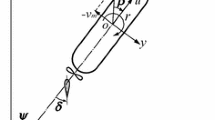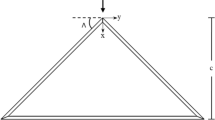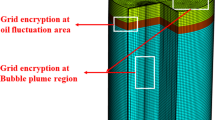Abstract
Problems experienced during Floating Production, Storage and Offloading (FPSO) tandem offloading operations were investigated. The aim of this research was to improve the reliability of such systems, and it needed a means to assess them. Time-domain simulation and analysis of offloading systems was performed using the multi-body mooring software ARIANE 7.0. Hydrodynamic interaction between the vessels was considered. The responses of the offloading system in different loading cases, different parameters of offloading hawsers and the effects of challenging environmental conditions were calculated. There was a focus on the problems of relative motion between the two bodies and its effects on the intensity of hawser forces. Minimum relative distance, maximum relative headings and maximum tension in the hawsers of offloading systems were obtained by time-domain analysis. The time-domain analysis was effective and comparative study can be used to optimize parameters of the system and extend operating limits.
Similar content being viewed by others
References
Ariane7.0 Theoretical Manual (2007). Research Department of BUREAU VERITAS, 41–44
Chen H B, Moan T, Haver S, et al (2004). Prediction of relative motion and probability of contact between FPSO and shuttle tanker in tandem offloading operation. Journal of Offshore Mechanics and Arctic Engineering, 126(3): 235–242.
Compiler of “Guide of Offshore oil Engineering Designing” (2007). Designing of FPSO and single point mooring system. Petroleum Industry Press, Beijing, 47–49.
Günther FC, Katja J (2005). Multi-body systems in waves-impact of hydrodynamic coupling on motions. Proc. of the 12th IMAM Conf., 1–10.
Hong SY, Kim JH, Cho SK (2003). Numerical and experimental study on hydrodynamic interaction of side by side moored multiple vessels. Proc. of the Int. Symposium on Deepwater Mooring Systems Concepts, Design Analysis, and Materials, 198–215.
Inoue Y, Ali MT (2002). A study of slowly varying drift forces on multi-body floating system. Proc. of the 21st Int. Conf. on Offshore Mechanics and Arctic Engineering, 181–190.
Inoue Y, Ali MT(2003). A Numerical investigation on the behavior of multiple floating bodies of arbitrary arrangements in regular waves. Proc. of the 13th ISOPE Conf., 1903–1910.
Inoue Y, Seif MS (1997). Nonlinear responses of multiple floating systems. Proc. of the 16th Int. Conf. on Offshore Mechanics and Arctic Engineering, 259–267
Inoue Y, Islam MR(2000). Numerical investigation of slowly varying drift forces of multiple floating bodies in short crested irregular waves. Proc. of the 10th ISOPE Conf., 174–182.
Inoue Y, Islam MR(2001). Effect of viscous roll damping on drift forces of multi-body floating system in waves. Proc. of the 11th ISOPE Conf., 279–285.
Inoue Y, Islam MR (1999). Comparative study of numerical simulation and the experimental results for a parallel connected FPSO and LNG in waves. Proc. of the 9th ISOPE Conf., 360–367
Koo BJ, Kim MH (2006). Global analysis of FPSO and shuttle tankers during side-by-side offloading. OTRC, Texas.
Morandini C, Legerstee F, Mombaerts J (2002). Criteria for Analysis of Offloading Operation. Proc. of the 34th OTC Conf, Houston, 4–5
Recommended practice for planning, designing, and constructing floating production systems (API RP 2FPS: 2001 IOT) (2004). The Committee of Native Development and Reform, Beijing,61–63
XIJIANG23-1 OIL TERMINAL REFULATIONS (2008). CNOOC, Shenzhen, 11.
Yin Xun-fu, Liu Ai-ju, Zhang Hai-bo (2002). Current Conditions in the Eastern South China Sea—II. Ocean Storm Current Phenomenon. Journal of Oceanography of Huanghai & Bohai Seas, 20, 7–11.
Author information
Authors and Affiliations
Corresponding author
Additional information
Foundation item: Supported by China National 111 Project foundation from the State Administration of Foreign Experts Affairs of China and the Ministry of Education of China.under Grant No. B07019.
Qiang Wang was born in 1986. He is a graduate student of Harbin Engineering University. His current research interests include offloading operation, mooring system, etc.
Li-ping Sun was born in 1962. She is a professor at Harbin Engineering University. Her current research interests include deepwater technology, etc.
Shan Ma was born in 1976. He is an associate professor at Harbin Engineering University. His current research interests include global performance analysis of floating structure, etc.
Rights and permissions
About this article
Cite this article
Wang, Q., Sun, Lp. & Ma, S. Time-domain analysis of FPSO-tanker responses in tandem offloading operation. J. Marine. Sci. Appl. 9, 200–207 (2010). https://doi.org/10.1007/s11804-010-9070-4
Received:
Published:
Issue Date:
DOI: https://doi.org/10.1007/s11804-010-9070-4




